It was Christina Kuo’s (郭綵婕) daughter’s first birthday cake and it was a beautiful sight — layer upon layer of mouth-watering chocolate. To Kuo’s horror, the minute her daughter bit into it, her skin broke out in hives, her fingers swelled up and she developed a high fever. Kuo speculates that the bakery forgot about their request and used eggs, which her daughter is allergic to.
Though she recovered quickly, Kuo says the most heart-wrenching moment came when her daughter asked: “Mommy, so does this means I can’t eat cake for the rest of my life?”
‘VEGAN-FRIENDLY’ CITY
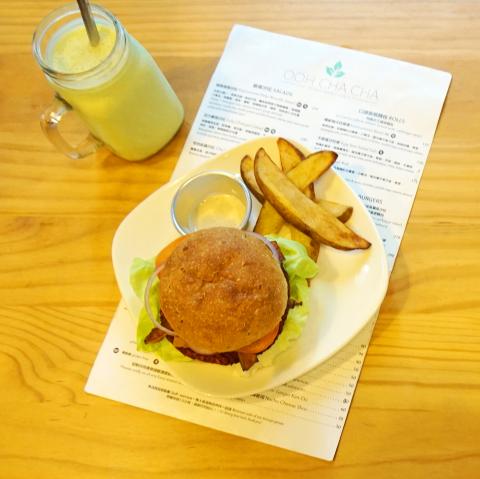
Photo: Dana Ter, Taipei Times
That’s when the idea of opening a vegan bakery struck Kuo and her Indian expat husband Ravi Dadlani.
“I just wanted to show people that you can be allergic to dairy... or be a vegan and still enjoy cakes and desserts,” says Kuo who opened Fresh Bakery and Cafe in 2013.
The bakery substitutes soy milk and almond milk for regular milk and uses more flour in their cakes instead of eggs.
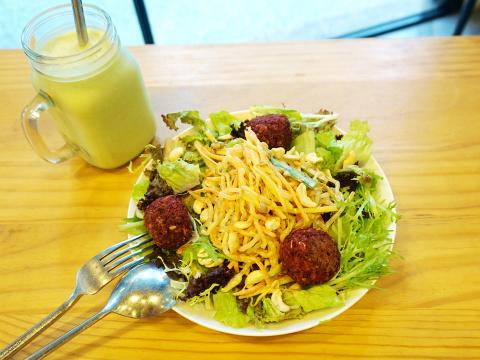
Photo: Dana Ter, Taipei Times
The bakery’s four-year anniversary falls at an auspicious time. Last month, animal rights group People for the Ethical Treatment of Animals (PETA), Asia, named Taipei the most “vegan-friendly” city in Asia.
Much has changed since 2013. Vegan restaurants like Ooh Cha Cha and Soul R Vegan and bakeries like Vegan Haven and Green Bakery have been popping up all over the city.
“You will never worry about not being able to find... a ‘bacon and cheese’ burger or mocha and walnut waffles,” says Jason Baker, PETA Asia’s vice president.
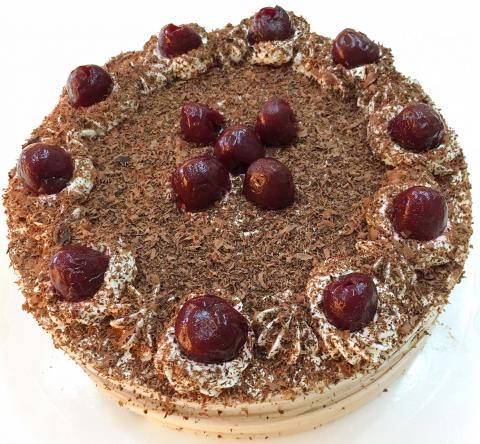
Photo courtesy of Fresh Bakery & Cafe
“On a recent trip to Los Angeles, people talked about how jealous they were about me being so close to Taipei and having the chance to taste the great vegan cuisine there,” Baker says.
Taipei was an easy choice, he says, because of its vegan movement, which has grown exponentially over the last few years.
TRANSPARENCY AND CHIA SEEDS
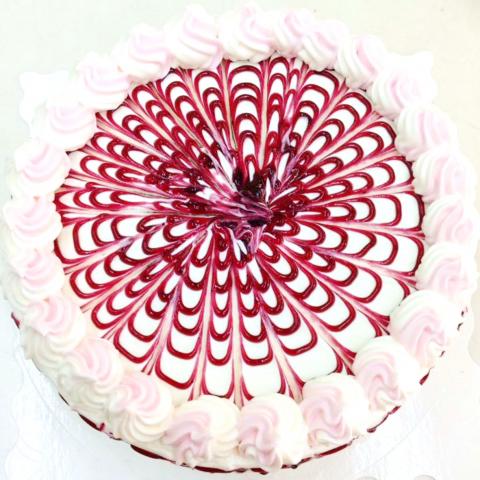
Photo courtesy of Fresh Bakery & Cafe
When I visit Kuo at Fresh Bakery & Cafe’s new location, she says she isn’t shocked that Taipei — a city known for its street food and night market delicacies — claimed the title.
Taipei has a large vegetarian community, many of whom are Buddhists, so the transition to veganism — cutting out dairy — wouldn’t be too big of a leap. Buddhism also teaches not to be cruel to animals, which is another important tenant of the vegan lifestyle.
A series of nation-wide food safety scandals — which involved restaurants and roadside stalls using recycled oil collected from grease traps — have made consumers wary of the ingredients used in their food.
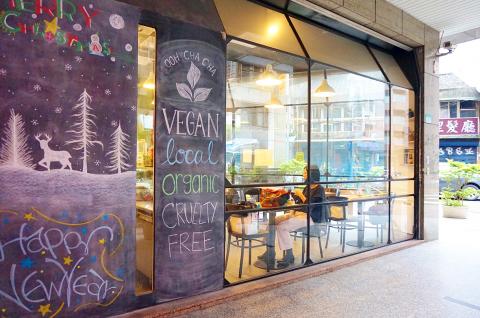
Photo: Dana Ter, Taipei Times
Mai Bach, founder of Taipei’s first vegan restaurant Ooh Cha Cha, agrees that these two factors have contributed to the spread of veganism in Taipei.
“After the food safety scares, consumers are becoming more sensitive to the types of ingredients that restaurants are using,” she says.
The sun streams into the floor-to-ceiling windows of Ooh Cha Cha’s compact corner shop near Guting MRT station as we chat over smoothies packed with superfoods and a Vietnamese kelp noodle salad with ginger beet balls — “meatballs” made from beet.
When the California native opened her restaurant in November 2013, it was difficult to find ingredients because the vegan market was still finding its footing. Today, you don’t have to travel too far in Taipei to find something as rare as chia seeds, a nutrient-rich superfood.
“It was a sure sign that the market was ready to accept veganism,” Bach jokes.
Education through social media is a huge part of Ooh Cha Cha’s mission — they regularly post about the ingredients they use on their Facebook page.
VEGAN JUNKIES
A hurdle that both Kuo and Bach faced when getting started was convincing consumers that vegan food could be tasty.
“People would walk into our shop and ask if there were any meat options,” Bach says. “When we tried to explain to them why we didn’t, they sometimes walked out.”
Kuo says that much vegetarian food served in local restaurants is bland or greasy.
“We had some problems with convincing people that eating vegan didn’t mean that you had to give up all the flavors that you love,” Kuo says. “For instance, tofu does not have to be bland. Instead of a black pepper steak, try cooking black pepper tofu.”
Bach says the transition from vegetarianism to veganism was a tough one. She found herself craving vegetarian buffets and potato chips. Yes, it turns out potato chips are vegan.
“I was such a junk food addict,” Bach says.
And yes, it is possible to be an “unhealthy vegan,” she adds. After doing some research and experimenting with recipes, Bach eventually learned how to create vegan meals that were healthy and appetizing. The beet balls are thoroughly delicious — they taste like actual meatballs but with an earthy kick — as is the Saigon Bowl, which includes lemongrass tofu, picked radish and carrot, bean sprouts and walnut pate.
Bach still allows some room for sin, though. On the menu is a wide selection of craft beer — vegan, of course.

The primaries for this year’s nine-in-one local elections in November began early in this election cycle, starting last autumn. The local press has been full of tales of intrigue, betrayal, infighting and drama going back to the summer of 2024. This is not widely covered in the English-language press, and the nine-in-one elections are not well understood. The nine-in-one elections refer to the nine levels of local governments that go to the ballot, from the neighborhood and village borough chief level on up to the city mayor and county commissioner level. The main focus is on the 22 special municipality

The People’s Republic of China (PRC) invaded Vietnam in 1979, following a year of increasingly tense relations between the two states. Beijing viewed Vietnam’s close relations with Soviet Russia as a threat. One of the pretexts it used was the alleged mistreatment of the ethnic Chinese in Vietnam. Tension between the ethnic Chinese and governments in Vietnam had been ongoing for decades. The French used to play off the Vietnamese against the Chinese as a divide-and-rule strategy. The Saigon government in 1956 compelled all Vietnam-born Chinese to adopt Vietnamese citizenship. It also banned them from 11 trades they had previously

Jan. 12 to Jan. 18 At the start of an Indigenous heritage tour of Beitou District (北投) in Taipei, I was handed a sheet of paper titled Ritual Song for the Various Peoples of Tamsui (淡水各社祭祀歌). The lyrics were in Chinese with no literal meaning, accompanied by romanized pronunciation that sounded closer to Hoklo (commonly known as Taiwanese) than any Indigenous language. The translation explained that the song offered food and drink to one’s ancestors and wished for a bountiful harvest and deer hunting season. The program moved through sites related to the Ketagalan, a collective term for the

As devices from toys to cars get smarter, gadget makers are grappling with a shortage of memory needed for them to work. Dwindling supplies and soaring costs of Dynamic Random Access Memory (DRAM) that provides space for computers, smartphones and game consoles to run applications or multitask was a hot topic behind the scenes at the annual gadget extravaganza in Las Vegas. Once cheap and plentiful, DRAM — along with memory chips to simply store data — are in short supply because of the demand spikes from AI in everything from data centers to wearable devices. Samsung Electronics last week put out word